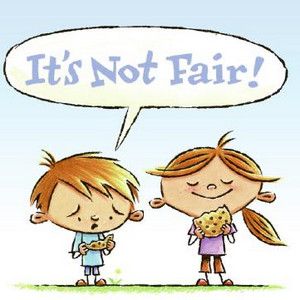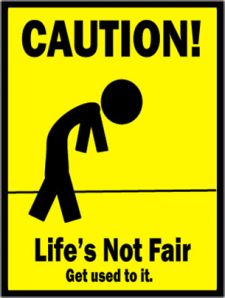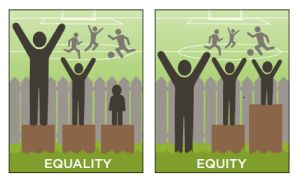|
Go to our website: https://bryanventures.com Welcome to the BEST blog: A place for Renee E. Bryan to Spout-Off "Who reads all this CR*P anyway?"
If you have something to share, you can email Renee at reneeb@bryanventures.com, or post it right on our Facebook page. Please be advised: Any references you choose to make to this blog are open game for future posts. (Who am I kidding? ANYTHING is game for future posts.) Thank you!
Renee E. Bryan also publishes writing at her blog: WrongWayLizzie.Me. |
||||
 |
"Making Life Fair" Published December 2017 This blog highlights our LIVE 2018 & 2019 insurance CE ethics course, THE BUSINESS OF ETHICS. |
|||
|
We all know the saying; we've heard
it many times, "Life's not fair." It is the far too
typical response whenever one cries out, just like the little cookie
holder to the left, "It's not fair." As if somehow telling
someone life isn't fair justifies someone else getting the larger share
of the cookie. We know this is true--that life isn't fair, and hearing
it doesn't really help the sooth the unjust nature of life. We've
experienced this unfairness many, many times, and yet somehow we seek
fairness when things seem unjust. Why? Why not just concede to the
unfairness in life? Why strive for justice and fairness when it alludes
us? Is this ideal fairness for all a possibility? Maybe, just maybe,
this concept of "fairness" might just be a matter of perspective. After
all, what I might consider fair, might create an "unfairness" to you. As an example, recently on Facebook I was having a discussion with some people, both friends and customers, about the Affordable Care Act (ACA). I just might have lost a bunch of readers with even the mention of "Obama Care", but please bear with me. This will not be a lecture and my intent is not to incite a volatile discussion. Nor do I intend to bore you. I simply want to offer a consideration of how very difficult fairness is to achieve. |
||||
|
As posts and considerations were
coming in on our
Facebook feed regarding the ACA, a
friend said, "Renee, tell me how it's fair that I pay more for my
insurance while others get a free ride?" The reference here is
to the fact that under the ACA, lower income American's may get a tax
credit to help make their premiums and coverage more affordable or may
receive health insurance they do not have to pay for. The latter is
Medicaid. It's been around a long-time--since 1965 to be exact. This is
also when we began offering Medicare. These two pivotal healthcare
programs were enacted during the Johnson administration. Most recently,
the ACA increased the income limits for Medicaid eligibility thereby
allowing more Americans access. So, my friend, who must make enough money to not qualify for this financial assistance, would like to know how it's fair that others get assistance while he pays the full health insurance premiums (and probably a hefty tax bill) while others pay less on both counts. The answer to this question lies in "how" you look at "fairness". Historically we've considered things fair when we all get or pay the same. Like the picture above with the two kids and their split cookie, most American's consider it "fair" when we each get the same amount. If we equate this to health insurance, it meant that all employees received the same insurance plan (or plan offers) and each employee would pay the same premium. In this method of fairness, all employees seeking individual coverage would pay the same premium; all employees wanting to add dependents, would pay the same premium too. We considered this method of sameness as "fair". |
 |
|||
 |
||||
|
However, under this method of fairness, it becomes clear that this "same" premium is a greater share of the lowest paid employees' income, while this "same" premium is a smaller share of the highest paid employees' income. By considering this "same" premium in this fashion, it now becomes unfair.
Medicare attempted to change the unfairness of the "same" concept. With the Medicare premium, all employees pay the same percentage of their income (1.45% if you are an employee which is then matched by your employer; or 2.9% for the self-employed). There is no income cap for the Medicare tax which means the highest paid employees pay a greater share of this premium while the lower paid employees would pay far less. Of course, under this calculation of "fairness", those with the greater income just like my friend then say, "I pay more and that's not fair." |
||||
|
These two differences in perceiving
"fairness" are illuminated in the graphic above. It shows EQUALITY to
the left, which is the sameness of the health insurance premiums
illustrated by the same size boxes, and EQUITY on the right which is an
attempt to consider each person's starting point and create variables
that hope to offer something more equitable. Which of these two options you prefer depend on your perspective, and interestingly enough, when you consider the picture above, all it took was for the tallest person to give the block they didn't need to the shortest person. When we consider equality from the perspective of the ACA and/or our health insurance premium examples, this means those that have more than enough to provide for their needs share with those that don't, and honestly, I don't know about you, but I sure the heck would rather feel financially secure with the ability to share with those in need than to be concerned that I'll never be able to feel financially secure. At this point in a political discussion of "fairness", the tall person on the box above might start saying things like, "That short person (the poor) could do more!" As it relates to the ACA, we could also jump into the skyrocketing cost of healthcare and pharmaceuticals, overutilization, chronic over medicated Americans, or the MANY things that could be done to target the underlying problem of tall people building ENORMOUS boxes and our elected officials giving them all the building supplies to do it. Good gravy, we would have a whole different discussion of fairness and perspectives so I'm going to leave all of that alone. My intent here is to illustrate that even a simple word like "fair" can become very complex when we consider moral concepts from a few different perspectives. These perspectives are highlighted in our new LIVE classroom insurance continuing education ethics course this year, THE BUSINESS OF ETHICS. We'll certainly expand this discussion of fairness and also take a hard look at truth and goodwill to ensure we, as insurance professional, consider truly ethical business practices. I hope you join us! I'd love for you to jump into this discussion with your thoughts and considerations. See you in class. WANT TO SHARE YOUR IDEAS? Email Renee; or post on our Facebook page. Comments are based on the personal experiences or opinions of Renee and may not reflect the objective of Bryan Ventures, Inc. |
||||
,